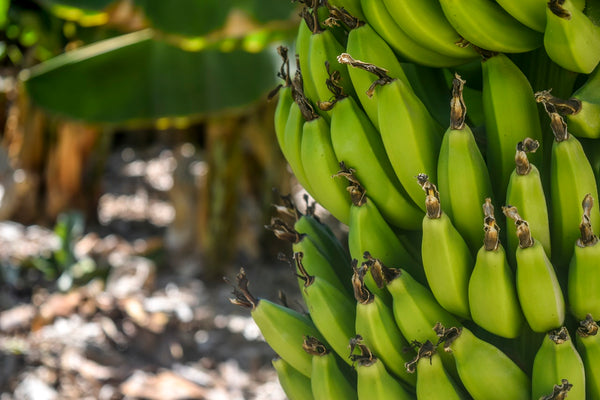You know what really makes us go bananas? Banana Trees! Their vibrant yellow fruit attracts our attention, and the sweet, creamy flesh of the bananas is irresistible for snacking. Some of the most popular summertime desserts, like banana pudding and ice cream sundaes, include bananas.
Best of all, bananas are an excellent source of nutrients. Calcium, potassium, vitamin A, vitamin C, fiber, electrolytes and more fuel the body with natural energy and protection.
So, Banana Trees are pretty much essential for your garden...especially since they can be brought inside to thrive through fall and winter. But how do you get a ton of fruit? Check out our tips and tricks below.
Types of Banana Trees
For starters, make sure you select the right banana tree variety. Sometimes Bananas, like the Cold Hardy Banana Tree, don’t actually produce fruit.
Cold Hardy Banana Tree
The Cold Hardy Banana Tree or ‘Basjoo’ is an ornamental banana tree with a tropical look, but it won’t produce fruit.
Cavendish Banana Tree
The Cavendish Banana Tree tastes sweet and produces the banana variety that is most commonly found in supermarkets.
Grand ‘Naine’ Banana Tree
Grand ‘Naine’ Bananas taste even sweeter, with a softer and creamier texture than the Cavendish.
Ice Cream Banana Tree
The Ice Cream Banana Tree tastes incredibly sweet with hints of vanilla. The fruit’s soft, creamy texture melts in the mouth and can be quite addicting.
Red Banana Tree
Red Bananas are sweet with a tropical tang similar to mangoes.
Best Growing Zones for Banana Trees
Most fruiting bananas are cold hardy down to growing zones 9 through 11. If you live farther up North, place your banana trees in containers and bring them inside during the colder months.
And Banana Trees don’t like to be alone. When you plant your Banana Trees, ensure you’re planting in groups of three or more for best fruiting.
How to Plant a Banana Tree
Place them in an area that receives at least six hours of direct sunlight a day. If your trees are kept inside, place them near a large sunny window.
They are sensitive to wind as well, so make sure you place them near a wall or behind a row of evergreens.
Furthermore, Banana Trees prefer slightly acidic soil with a pH balance ranging from 5.5 to 6.5. You can test the pH of your soil with a kit from a local gardening store. Raise the acidity of your soil by adding peat moss or a fertilizer that’s high in nitrogen.
Ground-wise, keep the soil moist but not oversaturated. You can improve the drainage of your soil by adding organic material like peat moss. If your tree is in a container, make sure it has drainage holes at the bottom. If it doesn’t have holes, they can easily be added with a drill.

Banana Tree Care and Growth
Keep Banana Trees warm in the winter. Cover their bases with mulch to insulate their roots and to keep weeds away. If a frost comes, cover your tree with a sheet or burlap to protect the leaves (uncover the next morning).
Soil and Fertilizer for Banana Trees
During the summer, fertilize your Banana Trees once a month with a well-balanced organic fertilizer. Formula 10-10-10 is an excellent choice.
After your banana harvest, cut your tree back to about 30 inches and let the stem dry out for two weeks before removing it. Banana stalks only produce fruit once, so it’s important to cut them back for new fruit to grow.
Ground-wise, it’s important to keep the soil moist but not oversaturated. You can improve the drainage of your soil by adding organic material like peat moss. If your tree is in a container, make sure it has drainage holes at the bottom. If it doesn’t have holes, they can easily be added with a drill.
How to Harvest Bananas
Bananas are typically ready to be harvested late spring or early summer. The best time to pick your bananas are when the fruit is still green.
After your banana harvest, cut your tree back to about 30 inches and let the stem dry out for two weeks before removing it. Banana stalks only produce fruit once, so it’s important to cut them back for new fruit to grow.
Growing Banana Trees
Banana Trees are an excellent addition to the landscape and can be kept in containers indoors. They have large, wide and flat tropical leaves to give any space an exotic feel. Plus, they produce bushels of sweet bananas that are full of healthy benefits. Order yours today!





